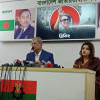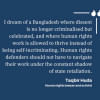July uprising: Proof won’t be shared till trials meet int’l standard

The UN will not share evidence from its investigation with Bangladesh unless trials of perpetrators of the brutal response to the July uprising meet international standards, says a top official at the UN Human Rights Office.
"The report does not identify perpetrators as such, but we have retained a large amount of material that is being archived to the highest standards so it can be used," Rory Mungoven, chief of the Asia-Pacific region at the UN rights office, said at a press conference in Geneva yesterday.
On cooperating with Bangladesh's judicial processes, he added, "The issue of the death penalty is a problem for us—as a UN policy, we are constrained from cooperating with trials that may lead to the death penalty."
He stressed that the process must be credible, fair, and adhere to international standards.
"We hope this will lead to a reconsideration of the death penalty in Bangladesh because it perpetuates a cycle of revenge," Mungoven said.
He also said that the death penalty would pose a barrier to the extradition of perpetrators hiding in other countries.
"For many member states, the death penalty is a barrier to extradition," he said. "All extraditions must respect international standards of due process and trial."
At the invitation of the interim government of Bangladesh, the Office of the United Nations High Commissioner for Human Rights (OCHR) conducted an independent fact-finding inquiry into alleged human rights violations that occurred between July 1 and August 15, 2024.
The UN agency published a 114-page report on its findings, describing what it called "crimes against humanity" in detail.
Volker Turk, the UN high commissioner for human rights, underscored the need for investigations, trial and justice and the possibility of trying these crimes in international courts.
"We have to make sure that universal jurisdiction can work for people who are outside the country," said Turk, adding that the perpetrators of serious human rights violations cannot be let scot-free and must be brought to account.
He called these investigations complex. "When cases are difficult to prosecute it is better to refer to the international jurisdictions," he said.
Mungoven pointed out that criminal investigations will face many challenges, and one is that the system has not changed. "Many people who were appointed by the last regime continue to operate in the government. This continues to obstruct reform.
"When you have a police force that is not yet reformed, tasked with investigating the crimes of the police, there is a conflict of interest."

 For all latest news, follow The Daily Star's Google News channel.
For all latest news, follow The Daily Star's Google News channel. 










Comments